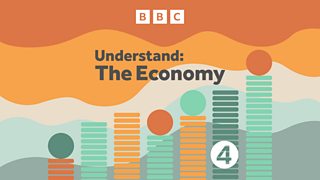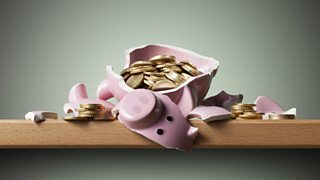How much money do you need to be happy?
It seems like a no-brainer that more money means more happiness. However, as Adam Shaw found out in this special live episode of 91�ȱ� Radio 4's Money Box, once basic needs are catered for, things can take a surprising turn. Our emotional relationship to income, debt and loss is complex and nuanced.
Helping Adam negotiate the ins and outs of money's relationship to wellbeing are Jan-Emmanuel De Neve, Professor of Economics and Behavioural Science at the University of Oxford, and Mark Williamson, the director of the charity Action for Happiness.
This is what they discovered about how our happiness is linked to wealth.
Money makes less difference to happiness the richer you get
There's no doubt that money talks, especially in times of crisis. As Professor De Neve says, money is "an enabler for people to live a decent life." However, the relationship between increased income and more happiness is 'logarithmic', which, in this case, means that if you doubled your income from £20K to £40K you would have to double it again, to £80K, to experience the same boost to your happiness and wellbeing, and you would have to keep doubling it to maintain the same emotional reward.
£120,000 is the 'best' it gets
Despite the logarithmic relationship between money and happiness, there is a caveat. Research has shown that you might be wasting your time trying to constantly double your salary – well at least above £120K. While many people are not fortunate enough to reach that level of income, those that do experience what Professor De Neve calls "a plateau" above which "they would no longer detect a statistically significant relationship between further money and life satisfaction."

Happiness is not all about income
While it's undeniably the case that people need to have their basic needs met – food, shelter, warmth, etc – there are, after this point, a number of factors that significantly contribute to wellbeing as well as income.
A key to happier living is to let go of comparisons, not just financial, but in every aspect of our lives.Mark Williamson, Action for Happiness
Director of the charity Action for Happiness Mark Williamson identifies a number of these quality-of-life factors. They include cultivating good relationships in the community (family, friends, work colleagues), deriving meaning from being part of something "bigger than ourselves" which can happen through giving in its various forms (eg. on an individual level or volunteering), resilience to life's 'curveballs' and autonomy - control over life choices - which doesn't always have to be tied to money.
Some of these factors are used by the Office for National Statistics to work out the UK's level of wellbeing, a more immediate measurement than trying to derive it from GDP (Gross Domestic Product).
Nordic countries are happier because of less inequality
Professor De Neve is one of the authors of the United Nation's World Happiness Report, which consistently puts Nordic countries at the top of the rankings. He cites strong social networks, welfare states that bring "a sort of psychological security" and trust in the government tax plans among the reasons for this.
A more equal society is another major factor, the professor says. "The levels of inequality are much lower than they are in more in economies like our own here in the UK. All of that means that, in our report, the average wellbeing or life satisfaction of somebody in Finland or Denmark is much closer to [a score of] eight. Whereas in the United Kingdom it's sort of around seven."
Comparative living leads to misery
It's human nature to make financial comparisons between ourselves and others. Economists call this a 'zero sum game' where one person's gain is another person's loss, while Adam calls it "relative income", where we ask: 'Am I richer or poorer than my friends, my neighbours, the people that are my role models?'

Mark Williamson believes that making financial comparatives can become a preoccupation "once our basic needs are met" and results in a "toxic influence on our wellbeing".
Fuelled by social media, there's a temptation for some people to make broader comparisons between their lives and those of others. "We often create a negative narrative about how well we're doing," says Mark, "so a key to happier living is to let go of that comparison, not just financial, but in every aspect of our lives."
We hate losing money more than we love gaining it
While it's a case of diminishing emotional returns when we earn more money, the opposite is true when we lose money.
Loss aversion, as it is known in behavioural economics, has been measured across various studies. Professor De Neve gives an example of someone losing £1,000 a year versus gaining £1,000 a year. "Wellbeing is twice as sensitive to the loss of income or purchasing power versus an equivalent gain in income," he says.
Paying off a debt is all about the journey
Another interesting psychological quirk about money is that, sometimes, the action of paying off part of a debt is more satisfying than completely settling it.
I feel quite empty about it. I have no financial goals now and I miss that.Listener Graham on paying off his mortgage
This notion is raised by one of Adam's listeners, Graham, who emails to say that it was "thrilling" to see the amount of his mortgage decrease. When a gift from relatives and access to his pension meant Graham could pay off his mortgage completely, he admitted that this didn't make it feel as happy as he thought it would. "I feel quite empty about it. I have no financial dreams or goals now and I miss that."
Choosing less consumption for more happiness
While saving and denying luxuries is often a necessary sacrifice, it can also be a deliberate and empowering act that enables someone to do things that matter to them.
One caller to the show, Barry from Manchester, was juggling career jobs with working with the homeless, initially as a volunteer and then in a low-paid role. Barry made the decision to weight his time towards the latter. "I made a conscious decision to minimise my consumption, and at the same time minimise the amount paid work I had to do."
For Mark Williamson, Barry is representative of "more people making conscious choices to say 'I know what matters to me, I want to spend more time doing the things I really care about.'"
"I think that's actually a really good model for making wise life choices."
For more on the subject of wealth and happiness, listen to the full discussion here.
The information contained in this article was correct at the time of broadcast on 4 January 2023.

More articles from 91�ȱ� Radio 4
-
![]()
Five 'tricks' to help us save more
How do we incentivise ourselves to save more money?
-
![]()
Five economic terms explained really simply
Inflation, interest rates and more - what they mean and how they affect you.
-
![]()
The death of retirement
Money Box explores what retirement might look like in the future.
-
![]()
A guide to compound interest
A brief explanation of the concept once called ‘the eighth wonder of the world’.





